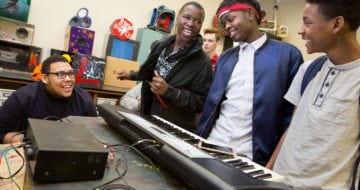On May 20, the American Youth Policy Forum hosted Recovery Must Not Leave Young Adults Behind, the first in a series of briefings focused on the needs of young adults. As Congress considers legislation to spark economic recovery from the COVID-19 pandemic, AYPF is educating congressional staff members and others on the lived experiences of young people and what policies will ensure an equitable recovery. During the first briefing, several experts described what they are seeing, and what would move the ball for young people.
David Baker works with young people experiencing homelessness in San Diego. He sits on the National Network for Youth’s National Youth Advisory Council. David noted that the pandemic has underlined the interconnectedness of the challenges facing young people. For example, access to childcare is linked to access to higher education, because young parents he works with are faced with a choice between continuing their education and caring for their family. One of the drivers of chronic homelessness is the weight of everything that young people are carrying in their metaphorical backpacks: They are weighed down by concerns about parents, working conditions, income, children, and past trauma.
David called for more “for us, by us” (FUBU) systems, ones that are informed by the experiences of young people and that center young people in decision making. Congress can address the surge in homelessness David is seeing: In his area the pandemic has shown how quickly communities can mobilize, with the right buy-in and investments.
Rachael Kauss works on the staff of the Senate Finance Committee, chaired by Sen. Ron Wyden (OR). He—together with other senators—reintroduced the Jobs for Economic Recovery Act (JERA) recently, which would create a permanent, national subsidized employment program. Rachael recognized that the pandemic has left a lot of people in crisis, especially young people. She argued that passage of a law like JERA would open doors for people struggling to connect to the labor force. JERA encourages employers to create new jobs by covering employee wages for the first six months, and it also funds supportive services that will help workers transition to permanent, competitive employment.
Rachael said that more Members of Congress need to hear from people in their districts or states about the need for a law like JERA. If Members hear from their constituents, Members can co-sponsor the bill to demonstrate that this is a priority for them in recovery legislation.
Dr. Kimberly Hoagwood is an expert on adolescent development, based at NYU Langone Health. She shared a number of disturbing trends. Suicide is the second leading cause of death among young people. Before the pandemic, suicide among young people was on the rise, with rates increasing each year since the Great Recession. As a proportion of ER visits by young people, psychiatric-related visits have more than quadrupled over that time. A September 2020 article in the Journal of the American Medical Association showed depression rates more than tripled during the pandemic, rising from 8.5% reporting symptoms to 27.8% during the pandemic.
For young people in crisis, the pandemic has made things worse. For youth experiencing homelessness:
-
54% say it’s now harder to meet one or more of their basic needs, particularly getting enough food to eat.
-
42% are having trouble getting case management.
-
32% report it’s harder to get substance use services.
Kimberly said that the good news is that we have effective practices to prevent and treat mental-health challenges among young people. Peer-to-peer models are especially effective: more services using this model and more credentials for applying this model are appearing. There are evidence-based solutions to the crisis facing young adults, and they are ready to be scaled.
Lenny Bell is a program coordinator for a YouthBuild program based at Des Moines Area Community College. Programs like YouthBuild help youth transition from trauma they are experiencing and build toward a new path. Lenny wants to see the program hire therapists in-house, but funding is lacking. Combined with a simplified eligibility and intake process, his program is ready to serve more young people, more comprehensively.
In discussion, David and Lenny shared what they would do to change systems and programs if they had a magic wand. David notes that they have created a collaborative in San Diego with seven of the largest youth serving organizations. He would like to see a day when there’s no competition for limited resources, when siloes are broken down, and when everyone is at the same table. Lenny proposed creating more housing options that are easier to access, and dreamed of a day when his program has staff members who can deal with all of the mental-health challenges and trauma that the young people they serve experience.
The Economic Recovery for Young Adults Series is hosted by the American Youth Policy Forum, in partnership with the Brookings Institute Metropolitan Policy Program, the Center for Law and Social Policy, the Center on Budget and Policy Priorities, The Corps Network, the Forum for Youth Investment, Heartland Alliance, Jobs for the Future, the National Network for Youth, the National Youth Employment Coalition, Opportunity Youth United, the Reconnecting Youth Campaign, and YouthBuild USA.
Upcoming Events
-
Center for Law and Social Policy’s A New Deal for Youth: Join their Changemakers (young adult leaders) on May 26 to learn more about their policy platform and demands (register here)
-
Youth Action Hour: Join these monthly youth-led virtual events (RSVP here)
Resources Referenced by Experts and Attendees
-
David is part of the National Network for Youth’s National Youth Advisory Council
-
Rachael works on the staff of the Senate Finance Committee, chaired by Sen. Wyden (OR): Sen. Wyden and other senators reintroduced the Jobs for Economic Recovery Act recently, which would create a permanent, national subsidized employment program
-
President Biden’s American Jobs Plan proposal and American Families Plan proposal
-
NYTimes: The Myth of Labor Shortages
-
A recent op-ed about the benefits of subsidized employment, written by CLASP’s executive director and a board member
-
A fact sheet that outlines a subsidized employment program focused on young people, authored by CLASP, Heartland Alliance, and National Youth Employment Coalition (NYEC) – and some principles for subsidized employment
-
An op-ed calling for a “13th year” to help students with disabilities prepare for postsecondary education and work
-
The Reconnecting Youth Campaign advocates for increased federal spending on opportunity youth
-
NYEC’s All Youth Connecting Forum will take place June 21-24:
-
Young people can propose to present ideas for improving their communities during the Action Hour







